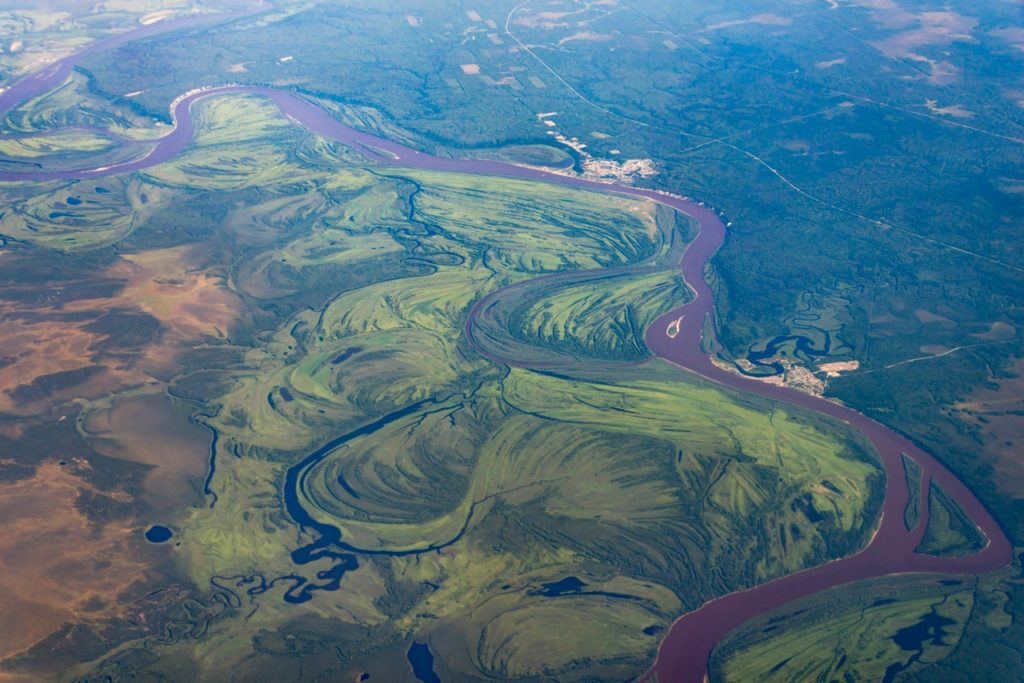The Mother of All Rivers Posted by ryan on Oct 4, 2021 in Uncategorized
As the old song goes, Широка́ страна́ моя́ родна́я1wide is my home country. Russia is the largest country in the world by far. Its borders stretch from its westernmost to easternmost points over 9,000 kilometers (over 5,000 miles), covering a total area of over seventeen million square kilometers (6.6 million square miles), which is one-eighth of the total land area on earth. This massive land area encompasses many different climates, landmasses, and bodies of water. However, Russia does not have significant access to any major oceans, which has caused the nation to historically rely on its many rivers to travel around the country and to grow and develop.
Река́ (pl. ре́ки) is probably the first geographical feature that anyone learns the Russian word for, if only because rivers in Russia have always been the lifeblood of the country. Every река́ has a исто́к source and an у́стье mouth. Along its path a river may have another, smaller river join it called a прито́к tributary. What does a river do? From the word течь to flow – Река́ течёт.
A river is flanked by берега́ banks (singular – бе́рег, see declension here). Just like in English, there is a пра́вый бе́рег right bank and a ле́вый бе́рег left bank. For example, Го́род Яросла́вль стои́т на пра́вом берегу́ Во́лги.2The city of Yaroslavl sits on the right bank of the Volga.
If we are traveling by river, we use the word плыть to swim, travel by water + по + dative case. Я плыву по реке.3I am sailing down the river. Теплохо́д плывёт по Ангаре́4The steamboat is sailing down the Angara (river in eastern Siberia)..
The concepts of “upstream” and “downstream” are reflected in the terms выше higher up and ниже lower down.
Sometimes along a river a ги́дроэлектроста́нция (ГЭС) hydroelectric station is built. This is made by building a large плоти́на dam, which, of course, floods a large area of land behind it and creates a водохрани́лище reservoir (from the words вода́ water and храни́ть to save, to keep).
Now that we have learned a bit of the vocabulary associated with rivers, I would like to state some interesting facts about one of Russia’s most prominent rivers.
Во́лга Volga
Во́лга всем рекам мать.5The Volga is mother to all the rivers.
As you can see from the above saying, Volga River occupies a special place in the mindset of Russian people. I will give you a few facts about the river below:
Исто́к нахо́дится в Тверско́й о́бласти.6The source is found in Tver Oblast.
Прито́ки Во́лги – Тверца́, Ока́, Ка́ма.7Some tributaries are the Tvertsa, Oka, and Kama.
На Во́лге располо́жены города́ Ни́жний Но́вгород, Волгогра́д, Каза́нь и Сама́ра.8The cities of Nizhny Novgorod, Volgograd, Kazan’ and Samara are located on the Volga.
Во́лга впада́ет в Каспи́йское мо́ре.9The Volga flows [lit. falls into] into the Caspian Sea.
Во́лга – са́мая дли́нная река́ Евро́пы.10The Volga is the longest river in Europe.
The area of land around the Volga is known as Пово́лжье.
Even though it doesn’t flow through any of Russia’s past or present capitals, the Volga was essential in the development of Russia as a state. Its sheer size and importance have inspired many, and travel along it was an important part of the Russian economy until only a few decades ago. The Volga is so significant to Russia that it lent its name to an iconic Soviet car make:
I will leave you with a very famous song about the Volga, performed by Людмила Зыкина Liudmila Zykina in her booming mezzo-soprano, kicked off by the words Издалека́, до́лго, течёт река́ Во́лга!11From far and for a long time flows the river Volga!
What other rivers do you know about in Russia? Do you know any interesting facts about them? Have you read or seen anything about life on the river in Russia?
- 1wide is my home country
- 2The city of Yaroslavl sits on the right bank of the Volga.
- 3I am sailing down the river.
- 4The steamboat is sailing down the Angara (river in eastern Siberia).
- 5The Volga is mother to all the rivers.
- 6The source is found in Tver Oblast.
- 7Some tributaries are the Tvertsa, Oka, and Kama.
- 8The cities of Nizhny Novgorod, Volgograd, Kazan’ and Samara are located on the Volga.
- 9The Volga flows [lit. falls into] into the Caspian Sea.
- 10The Volga is the longest river in Europe.
- 11From far and for a long time flows the river Volga!

Build vocabulary, practice pronunciation, and more with Transparent Language Online. Available anytime, anywhere, on any device.






Comments:
robin cresswell:
When I studied Geography at my school in England I was awestruck by the length of the 3 great Siberian rivers (Lena, Ob, Yenisey ) that flow into the Arctic Ocean
ryan:
@robin cresswell Робин, добрый вечер! Indeed, they are impressive rivers. I have always wanted to one day see the great rivers of Siberia myself and just admire their vastness.
David Roberts:
The song I know was the inspiration for the Seekers 1960s hit “The Carnival Is Over”, but the original Волга Волга, aka Из-за острого на стрежень tells a much darker story of machismo getting way over the top. The word стрежень is fascinating – I can’t see me ever needing to use it but I’ve never forgotten it! Partly because it gets you thinking about hydrodynamics and working out that if the river’s flowing straight it will be more or less mid-way between the two banks. There’s no single word translation in to English, and the first line is usually translated, incorrectly but it scans, as “From behind the wooded island”.
ryan:
@David Roberts Давид, добрый вечер! Thank you for your interesting comment! I love how some Russian folk songs have been made into 60s pop hits. I am a big fan of this Seekers song (and I’ve always-always loved Judith Durham’s voice). I’m certain you’re also familiar with Mary Hopkin’s “Those Were The Days,” which I believe is a bit more ostensibly Russian in origin.
River vocabulary has always fascinated me as well and стрежень is a wonderful word. My personal favorite has always been the word мель (the shallow part), and its derivative отмель. I also appreciate the descriptiveness of some of them. I remember standing by a river and a friend asked me how to say the word порог in English, with little context other than the fact that we were standing by a river. At that point I realized that, in addition to “doorstep” or “threshold” (the first words that came to my mind), that’s the Russian word for rapids!